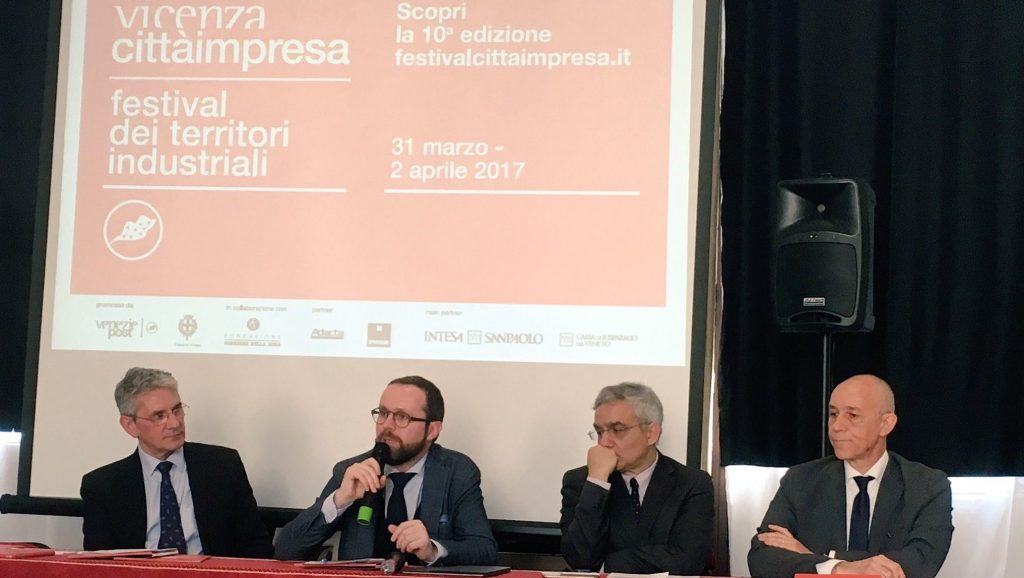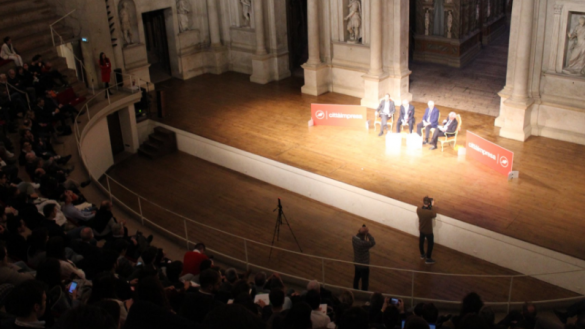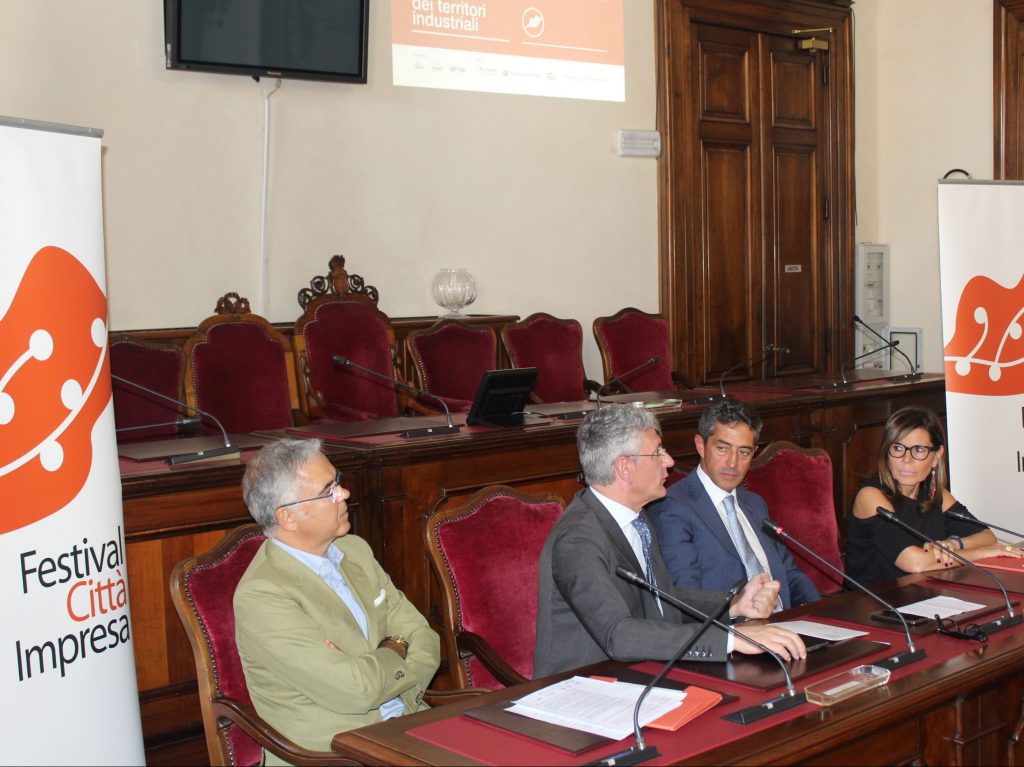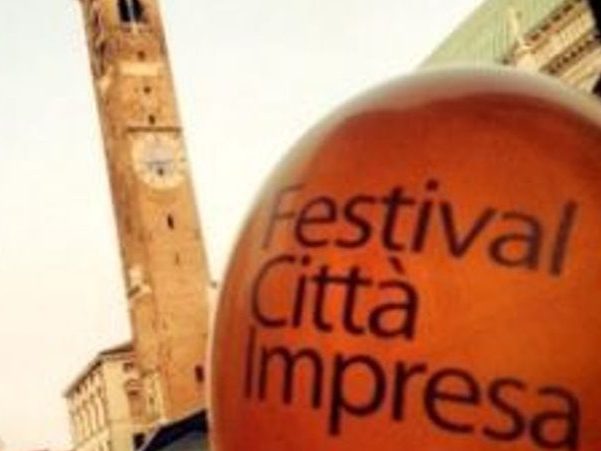Kicking off the 10th edition of Città Impresa in Vicenza on March 31. Guests include entrepreneurs, managers, European Parliament President Antonio Tajani, Minister Graziano Delrio and Anac President Raffaele Cantone. On its 10th anniversary, the Festival of Industrial Territories broadens its horizon to the Turin-Milan-Venice axis. In the fall, the twin edition in Bergamo.
It was born in 2008 to chronicle the Northeast metropolis. From Rovereto to Maniago, from Schio to Valdagno, from Montebelluna to Conegliano, from Camposampierese to Vittorio Veneto. It has covered the entire foothills of the Venetian regions for ten years, recounting their successes and critically analyzing their limitations. The Enterprise City Festival now returns for the third time and for its 10th
edition in Vicenza, March 31 to April 2, with a very rich program – directed by journalist Dario Di Vico – which will enliven the city’s most evocative venues, from the Teatro Olimpico to the Church of San Bartolomeo to Palazzo Chiericati, from the Palladio Museum to Palazzo Trissino and the Gallerie d’Italia – Palazzo Leone Montanari. The Festival, promoted by the publishing platform VeneziePost and the City of Vicenza, has the collaboration of the Corriere della Sera Foundation, the participation of Confindustria and Confartigianato Vicenza, the main partnership of Intesa Sanpaolo and Cassa di Risparmio del Veneto, and the partnership of Adacta and Synergie. “The new is born in the periphery,” repeated Enzo Rullani-who was the chairman of the event’s scientific committee in the early years-to emphasize the privileged vantage point that Città Impresa sought to cover. For better or worse, the Festival has always looked at the “new” that was emerging, including the decline of a model, that of the Northeast, and the emergence of a metropolitan Po Valley context of which the Venetias are now an integral part. And Città Impresa, in its ten years of existence, has nurtured the ambitions of this territory-the pocket-sized multinationals, the idea of a European capital of culture-and measured the failures, such as that of its popular banks. And it has always tried to cast its gaze beyond the contingent to grasp the meaning of the profound transformations that, accomplice to the crisis, have profoundly changed its connotations. With the emergence of new “Champions” enterprises capable of grinding out profits with innovative business models, and with the crisis of those that were not able or could not make the qualitative leap required by the times. It was thanks to this ability to always look ahead that, while the Northeast atrophied, the Festival Città Impresa grew. Thanks to the analyses of Stefano Micelli, Aldo Bonomi, Giovanni Costa, Giuseppe Berta, and the direction of Dario Di Vico, the Festival became over the years the laboratory of that Turin-Milan-Venice axis that constitutes the territorial platform of this country’s great innovative manufacturing heritage. Started ideally and concretely from Schio, from the intuition of the then Mayor Luigi Dalla Via and Gigi Copiello, Città Impresa then moved to the Vicenza-Bergamo axis, the two symbolic capitals of Italian manufacturing. With the now upcoming spring edition opening on Friday, March 31, in the city of Palladio, and an autumn edition to be held October 27-29 in the city of Kilometro Rosso. The program of the upcoming Vicenza edition reflects the characteristics of this new phase, interweaving the great economic and political debate with issues related to territorial development. The list of major players is endless: from Eni CEO Claudio Descalzi to European Parliament President Antonio Tajani, from Luigi Zingales to Raffaele Cantone, from Giuseppe De Rita to Ilvo Diamanti.
Above all, strong and articulated is the program related to the analysis of territories: from the opening conference with Stefano Micelli, Aldo Bonomi and Giuseppe Berta, to the confrontation between the Mayors of Turin(Chiara Appendino), Bergamo(Giorgio Gori) and Vicenza(Achille Variati), up to the tribute to Giacomo Becattini, the intellectual who first posed the birth of districts, where Enzo Rullani and Aldo Bonomi will confront each other. But the territory will also be central in the discussion on infrastructures – a key issue of the “Po Valley platform” (just think of High Speed, Smfr, highways or ports) – which will see Fabio Cerchiai (president Atlantia) and Renato Mazzoncini (CEO Ferrovie dello Stato Italiane) engaged in a discussion with Minister Graziano Delrio. But Città Impresa is, also, the ability to read the territory and the enterprise.
That is why the Festival is a succession of appointments that will feature managers such as Gabriele Del Torchio or Gerhard Dambach of Bosch Italia, Attilio Imi of Trafimet and Giulio Canale of Saes Getter, and entrepreneurs such as Andrea Rigoni, Elena Zambon, Katia Da Ros, Gianluca Seguso, and Antonio Bortoli. Labor issues will also be in the spotlight, with talks by Tommaso Nannicini and Maurizio Landini, but also about citizenship income with the presence of 5 Stelle Movement MP Mattia Fantinati and Undersecretary Pier Paolo Baretta. Also numerous are journalists and commentators such as Luciano Fontana, Gad Lerner, Ferruccio de Bortoli, Alessandra Sardoni, Gian Antonio Stella and Angelo Panebianco. Concluding the Festival will be “La Parisiana,” a tribute show to Goffredo Parise curated by Francesco Maino. Vicenza will thus be transformed for three days into a small Italian capital of economic-political debate, with dozens of appointments and thousands of professionals, entrepreneurs and young people from all over Italy who will flock to the five evocative locations distributed in the city’s historic center.
Promoters’ statements
“When we started ten years ago we were clear that the Northeast was at a turning point,” comments Filiberto Zovico, founder VeneziePost and creator of Festival Città Impresa, “And for ten years we tried to think about what was the course that could lead to a new phase of growth. We still don’t know if we have ended up in a dead end or if we are taking a new path. Certainly today we are still here to field new ideas that will enable businesses and territories to get out of this difficult phase and build inclusive models of development.” “Cities and businesses: two central concepts in Veneto’s identity,” adds Vicenza’s deputy mayor and growth councillor Jacopo Bulgarini d’Elci, “Cities and businesses dot the landscape of our region: not only the physical one, but also the value one. They define its horizon. The imaginary. The history. In a perpetual intertwining of the richness of artistic heritage and the richness of goods, of production, of invention. With Palladio, the villa is reinvented to intersect the exaltation of pure beauty with the needs and functionality of the work of the fields: the Palladian villa is a place of production, an ideal factory ante litteram. Vicenza has always seen creativity, productivity, innovation, inventiveness, and the pursuit of beauty go hand in hand. It is therefore a manifest destiny that leads us to host the Festival Città Impresa among these squares, in these palaces and theaters, in the halls and under the vaults that still testify to how, not at all magically, the spirit of enterprise can inhabit cities, change their shape, and eternalize them in beauty.” “The renewed presence of the Intesa Sanpaolo Group at the Festival is part of the commitment aimed at raising the general public’s awareness of relevant economic-financial phenomena and aims to reaffirm its support for quality initiatives aimed at the dissemination of knowledge and the development of the country,” concludes Carlo Moretti, deputy general manager of Cassa di Risparmio del Veneto. “In addition, the event represents a preferential channel for encouraging the conscious cultural growth of the new generations, contributing to their education and developing their skills to integrate into increasingly dynamic societies. We are therefore particularly pleased to be associated with the Festival Città Impresa as this association allows us to strengthen our ties with the communities in which we operate, alongside local realities to create, consolidate and develop those constructive relationships that Cassa di Risparmio del Veneto has in the area, thanks also to its strong roots in the Vicenza area where part of our Group’s history originates through the legacy of Banca Cattolica del Veneto.”
The program of the event
Friday, March 31. The opening meeting, to be held at 11 a.m. at the Gallerie d’Italia – Palazzo Leone Montanari, will be dedicated to the relationship between territories and will feature greetings from Fabrizio Spada, director Regional Representation in Milan of the European Commission, and an introduction by Fabrizio Guelpa,head of Industry and Banking of Intesa Sanpaolo’s Studies and Research Directorate, speeches by Giuseppe Berta, Aldo Bonomi, Stefano Micelli, and interviews with Agostino Bonomo and Luciano Vescovi; Corriere del Veneto editor Alessandro Russello will conduct the meeting.
The first day of the Festival will then feature a debate on banks condemned to change (3 p.m., Olympic Theater) and will see, after greetings by Gilberto Muraro, president Cassa di Risparmio del Veneto, speeches by Ferruccio de Bortoli and Luigi Zingales; Nicola Saldutti will coordinate the meeting. Also at 3 p.m., but at Palazzo Chiericati, Ercole Bonini, Luca Dal Ferro of Service Group Engineering Innovation, Fabrizio Dughiero will discuss ways to innovate between patents, skills and funding, pro-rector of technology transfer University of Padua, Marco Ronconi of Credito Neafidi. On the analysis of why it is difficult to import managers to the Northeast will speak at 4:30 p.m. (Gallerie d’Italia – Palazzo Leoni Montanari) Giovanni Costa, Gabriele Del Torchio, Attilio Imi, managing director of Trafimet Group, Massimo Quizielvù of Glasford International Italia and Elena Zambon; Francesca Basso will coordinate the discussion. At the same time, but at Palazzo Trissino, there will instead be a discussion on “Italians in China and the Chinese in Italy”: speakers will include Nomisma managing director Andrea E. Goldstein, Alberto Rossi of Centro Studi per l’Impresa Fondazione Italia-Cina, Umberto Simonelli of Brembo; Guido Corbetta will coordinate the meeting. Also at 4:30 p.m. (Palazzo Chiericati), they will instead discuss “bonds and the stock market” with speeches by Giulio Canale vice president of Saes Getters, Ilario Novella, Andrea Rigoni, Gianmarco Russo and Luca Tavano of Borsa Italiana; Roberta Paolini will coordinate the meeting. At 6 p.m. at the Teatro Olimpico there will be a discussion on the difficult balances of geopolitics: deputy editor of the Corriere, Daniele Manca, will coordinate the debate between Claudio Descalzi, CEO of Eni, and Angelo Panebianco; this will be followed by an interview with the president of the European Parliament Antonio Tajani.
There will also be several appointments related to book presentations, such as those dedicated to citizenship income, which will be held at 4:30 p.m. (Palladio Museum) where, after an introduction by author Stefano Toso , Pier Paolo Baretta, Mattia Fantinati, and Paolo Pirani will speak; Sandro Trento will coordinate the meeting. Another book being discussed will be on the phenomenon of “uberization,” also held at the Palladio Museum at 6 p.m.: introduced by Ivana Pais and the author will speak, Antonio Belloni, and Matteo Sarzana of Italy Deliveroo; Paolo Giacon coordinates the meeting. Also at 6 p.m., at Palazzo Chiericati, journalist Alessandra Sardoni, author of “Irresponsible,” will discuss “lying leadership” with Piergaetano Marchetti, Giovanni Orsina and with the founder of the Olive Tree Arturo Parisi; Stefano Menichini will coordinate the meeting.
Closing the day will be a dialogue between Ilvo Diamanti and Gad Lerner, coordinated by the editor of Il Giornale di Vicenza, Luca Ancetti (9 p.m. at the Teatro Olimpico) on populism and the ghost of the strong man; and “A Beer with the Entrepreneur”: here Dario Loison, Enrico Rosà of Veneta Sedie, and Michele Vecchiato will speak, general manager Antoniana Brewery, with moderation by Gian Luca Toschi, Northeastern Foundation researcher (9 p.m., Palazzo Chiericati). Saturday, April 1. The second day of the Festival opens at 10 a.m. with an appointment dedicated to small industries and the internet of things, with talks by Marco Bettiol, Pietro Francesco De Lotto, director Confartigianato Vicenza, coordinated by Rita Querzè. At the same time they will talk about “selling a brand not just a product” with talks by Lucio Carli of Fratelli Carli, Carlo Moretti,
Deputy general manager Cassa di Risparmio del Veneto, Maria Carmela Ostillio, head and scientific coordinator Brand Academy SDA Bocconi, and Riccardo Pasqua di Bisceglie di Pasqua Vigneti e Cantine; coordinated by Guido Corbetta (Gallerie d’Italia – Palazzo Leoni Montanari). Also at 10 a.m., but at Palazzo Chiericati, a discussion on “robots that speak Italian,” with an introduction by UCIMU general manager Alfredo Mariotti and speeches by Domenico Appendino, vice president Prima Industrie and president Siri, and Marco Taisch, professor at Milan Polytechnic; coordinated by Federico Nicoletti. Again at 10 a.m. (Palladio Museum) another discussion on “people who restructure while machines execute”: speakers include Considi CEO Gianni Dal Pozzo, M31 founder Ruggero Frezza and CUOA president Federico Visentin.
At 11:30 a.m. instead, the debates on “the losers of globalization” at the Olympic Theater with speeches by Giuseppe De Rita, Maurizio Landini, Tommaso Nannicini and Dario Di Vico and on “sharing Italy” where, after an introduction by Renzo Simonato, Stefano Barrese, Paolo Gubitta, Remo Pedon will speak; Fabio Savelli (Gallerie d’Italia – Palazzo Leoni Montanari) will coordinate the meeting. Also at 11:30 a.m., but at Palazzo Chiericati, there will be a discussion on the future of the “dairy” sector with Nicola Cesare Baldrighi of the Consorzio di Tutela Grana Padano, Antonio Bortoli of Lattebusche and the head of the secretariat of the Minister of Agriculture Angelo Zucchi.
The afternoon will open at 3 p.m. at Palazzo Trissino with a discussion on mayors territories and big politics. The Mayor of Turin, Chiara Appendino, will speak, that of Bergamo, Giorgio Gori and the mayor of Vicenza Achille Variati; coordinated by Stefano Menichini. At the same time, discussion on the silent fintech revolution with talks by Giovanni Bossi of Banca Ifis, Giovanni Costa, Francesco Fiore of Circuito Venetex and Fabrizio Villani of Fintastico; coordinated by Stefano Righi (Gallerie d’Italia – Palazzo Leoni Montanari). Also at 3 p.m., but at Palazzo Chiericati, the topic of Work 4.0 will be addressed: speakers include Paolo Candotti of Digital Innovation Hub, Gerhard Dambach of Bosch Italia, Stefano Franchi, director of Federmeccanica and the national secretary of Fim CislRobertaRoncone; Rita Querzè coordinates.
At 4:30 p.m., however, at Palazzo Trissino, there will be a discussion on how we explain active labor policies to young people. Speakers will include Maurizio Del Conte, president Anpal; Giuseppe Garesio, vice president Assolavoro; Tiziano Treu; and Luca Vignaga, HR director Marzotto Group; coordinated by Diana Cavalcoli and Fabio Savelli. At the same time, but at Palazzo Chiericati, the value of economic forecasting will be discussed with talks by professors Francesco Daveri, Gianluca Meloni, Sandro Trento and Stefani Tomasini, head of Prometeia; Guido Corbetta coordinates the meeting. Also at 4:30 p.m., at the Palladio Museum, a tribute to Giacomo Becattini with Marco Bellandi, professor at the University of Florence, Aldo Bonomi and Enzo Rullani; the meeting is coordinated by Il Sole 24 Ore correspondent Paolo Bricco.
At 6 p.m. at the Teatro Olimpico, a crucial issue for the Northeast will be discussed. In fact, on Tav and highways the minister will speak. Graziano Delrio. Paolo Possamai, director Il Mattino di Padova, will coordinate the discussion involving Fabio Cerchiai, president Atlantia, and Renato Mazzoncini,chief executive officer Ferrovie dello Stato Italiane.
Closing the day, at 9 p.m., are appointments dedicated to the fight against corruption (Olympic Theater) with Raffaele Cantone, president of the National Anti-Corruption Authority, and Gian Antonio Stella, with moderation by Alessandra Sardoni (Olympic Theater), while at Palazzo Chiericati space will be given to the consumautors who have taken power, with dialogue between Francesco Morace,author of Consumautori, e Aldo Cibic, founder of CibicWorkshop, moderated by Antonio Maconi.
Sunday, April 2. The third and final day of the Festival opens with a discussion on Italian capitalism and the challenge to investment: it will be discussed by Gregorio De Felice (chief economist Intesa Sanpaolo) and Fabio Storchi (president Federmeccanica), coordinated by Dario Di Vico.
In the afternoon, appointment with culture with journalist Marina Valensise – author of La cultura è come come la marmellata (Culture is like jam ) -, deputy mayor and councillor for growth of the Municipality of Vicenza Jacopo Bulgarini d’Elci, director of the Pirelli Foundation Antonio Calabrò and entrepreneurs Katia Da Ros and Gianluca Seguso; coordinated by Giampietro Vecchiato (3 p.m., Palazzo Trissino). Closing the 10th edition of the Città Impresa Festival, at 5 p.m. at the Teatro Olimpico, will be “La Parisiana 1986-2016,” a performance in homage to Goffredo Parise. ” La Parisiana 1986-2016” is a short-circuit of creative currents that sees
Francis Maino address the reading of Parise’s texts, accompanied by suggestions of electronic and acoustic music(Tommaso Mantelli and Paolo Brusò) and visuals projected in double circumference(Marco Maschietto). Produced by Vicenza-based Ronzani Editore, Parisiana is the brainchild of the Venetian writer: “Not only celebration – highlights Maino – but intimate will and attempt to capture the soul of Goffredo Parise,” in a multifaceted performance that combines rhythmic reading with musical and visual experimentation.





